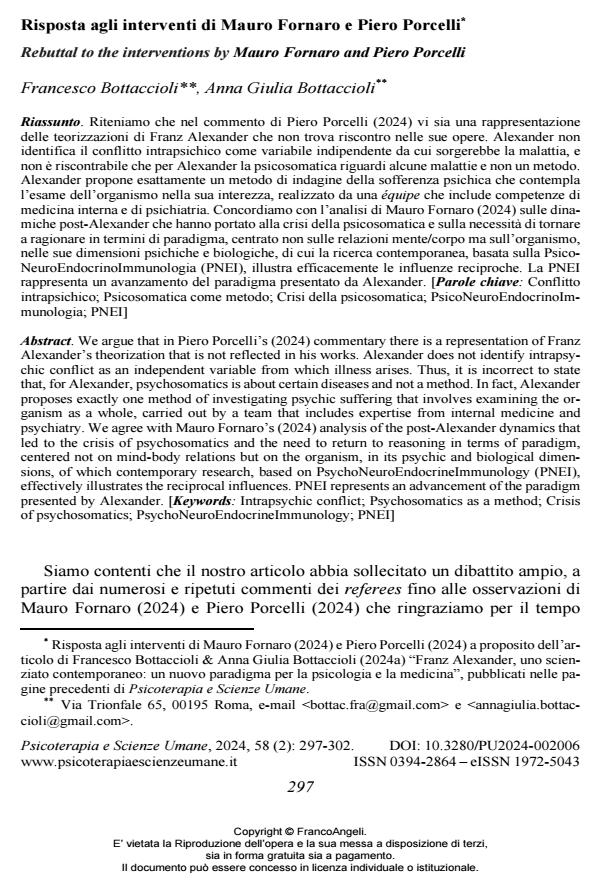Rebuttal to the interventions by Mauro Fornaro and Piero Porcelli
Journal title PSICOTERAPIA E SCIENZE UMANE
Author/s Francesco Bottaccioli, Anna Giulia Bottaccioli
Publishing Year 2024 Issue 2024/2
Language Italian Pages 6 P. 297-302 File size 97 KB
DOI 10.3280/PU2024-002006
DOI is like a bar code for intellectual property: to have more infomation
click here
Below, you can see the article first page
If you want to buy this article in PDF format, you can do it, following the instructions to buy download credits

FrancoAngeli is member of Publishers International Linking Association, Inc (PILA), a not-for-profit association which run the CrossRef service enabling links to and from online scholarly content.
We argue that in Piero Porcelli’s (2024) commentary there is a representation of Franz Alexan-der’s theorization that is not reflected in his works. Alexander does not identify intrapsychic con-flict as an independent variable from which illness arises. Thus, it is incorrect to state that, for Al-exander, psychosomatics is about certain diseases and not a method. In fact, Alexander proposes exactly one method of investigating psychic suffering that involves examining the organism as a whole, carried out by a team that includes expertise from internal medicine and psychiatry. We agree with Mauro Fornaro’s (2024) analysis of the post-Alexander dynamics that led to the crisis of psychosomatics and the need to return to reasoning in terms of paradigm, centered not on mind-body relations but on the organism, in its psychic and biological dimensions, of which con-temporary research, based on PsychoNeuroEndocrineImmunology (PNEI), effectively illustrates the reciprocal influences. PNEI represents an advancement of the paradigm presented by Alexan-der.
Keywords: Intrapsychic conflict; Psychosomatics as a method; Crisis of psychosomatics; PsychoNeuroEndocrineImmunology; PNEI
- Alexander F. (1950). Psychosomatic Medicine. Its Principles and Applications. New York: Norton (ristampa del 1987, con una Introduzione di George H. Pollock) (trad. it. Medicina psicosomatica. Firenze: Editrice Universitaria, 1951).
- Alexander F., French T. & Pollock GH. (1968). Psychosomatic Specificity. Volume 1: Experimental Study and Results. Chicago, IL: University of Chicago Press.
- Bottaccioli F. (2011). Attualità del programma di ricerca di Thomas Kuhn. PNEI News, 4: 19-22.
- Bottaccioli F. & Bottaccioli A.G. (2024a). Franz Alexander, uno scienziato contemporaneo: un nuovo paradigma per la psicologia e la medicina. Psicoterapia e Scienze Umane, 58, 2: 251-280. DOI: 10.3280/PU2024-002002
- Bottaccioli F. & Bottaccioli AG. (2024b). La rivoluzione in psicologia e psichiatria. Il tempo del cambiamento. Milano: Edra.
- Bottaccioli F & Bottaccioli AG. (2024c). The philosophical and scientific basis for the integration of medicine and psychology. In: Rezaei N. & Yazdanpanah N., editors, Psychoneuroimmunology. Vol. 1: Psychoneuroimmunology: Integration of Psychology, Neurology, and Immunology. Cham, CH: Springer, 2024, in press.
- Fornaro M. (2024). Psicosomatica: un caso di araba fenice. Note a latere dell’intervento di F. Bottaccioli & A.G. Bottaccioli “Franz Alexander, uno scienziato contemporaneo: un nuovo paradigma per la psicologia e la medicina”. Psicoterapia e Scienze Umane, 58, 2: 281-289. DOI: 10.3280/PU2024-002004
- Kuhn T.S. (1961). The function of dogma in scientific research. In: Crombie A.C., editor, Scientific Change: Historical Studies in the Intellectual, Social and Technical Conditions for Scientific Discovery and Technical Invention, from Antiquity to the Present (Symposium on History of Science, Oxford University, July 9-15, 1961). London: Heinemann, 1961, pp. 347-369 (trad. it.: La funzione del dogma nella ricerca scientifica. In: Kuhn T.S., Dogma contro critica. Milano: Raffaello Cortina, 2000, pp. 3-32).
- Kuhn T.S. (1962). The Structure of Scientific Revolutions (2nd edition: 1970). Chicago, IL: University of Chicago Press (trad. it.: La struttura delle rivoluzioni scientifiche. Torino: Einaudi, 1969).
- Porcelli P. (2024). Commento sull’articolo di F. Bottaccioli & A.G. Bottaccioli “Franz Alexander, uno scienziato contemporaneo: un nuovo paradigma per la psicologia e la medicina”. Psicoterapia e Scienze Umane, 58, 2: 290-296. DOI: 10.3280/PU2024-002005
- Commento sull'articolo di F. Bottaccioli & A.G. Bottaccioli "Franz Alexander, uno scienziato contemporaneo: un nuovo paradigma per la psicologia e la medicina" Piero Porcelli, in PSICOTERAPIA E SCIENZE UMANE 2/2024 pp.290
DOI: 10.3280/PU2024-002005 - Psicosomatica: un caso di araba fenice. Note a latere dell'articolo di F. Bottaccioli & A.G. Bottaccioli "Franz Alexander, uno scienziato contemporaneo: un nuovo paradigma per la psicologia e la medicina" Mauro Fornaro, in PSICOTERAPIA E SCIENZE UMANE 2/2024 pp.281
DOI: 10.3280/PU2024-002004
Francesco Bottaccioli, Anna Giulia Bottaccioli, Risposta agli interventi di Mauro Fornaro e Piero Porcelli in "PSICOTERAPIA E SCIENZE UMANE" 2/2024, pp 297-302, DOI: 10.3280/PU2024-002006